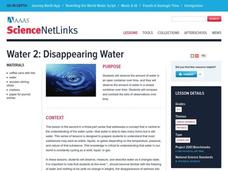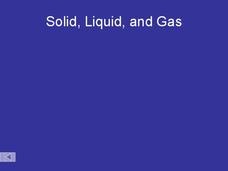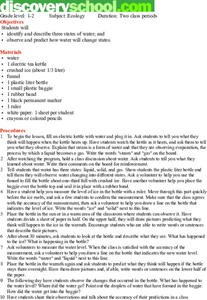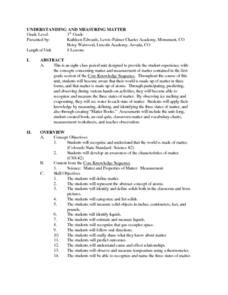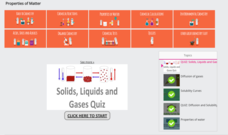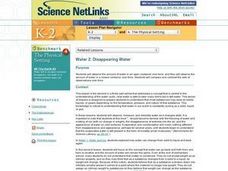Curated OER
Disappearing Water
Students explore the water cycle. In this earth science lesson, students observe and measure water in a closed container and in an open container. Students record their observations and compare their sets of data to draw conclusions...
Curated OER
States of Matter
By viewing this PowerPoint your students' understanding of molecular energy should increase. The properties and inter-particular forces are summarized. The logical progression of information is useful, but more data to demonstrate...
Curated OER
Thermochemistry
In this thermochemistry worksheet, students indicate whether the given processes are endothermic or exothermic reactions. Students complete the phase change diagram as well as define a given set of vocabulary words. Students calculate...
Curated OER
Water Magic
Young scholars conduct experiments with ice, water and steam to observe the water cycle. They discuss substances that water accumulates from the Earth as it moves through its cycle.
Curated OER
Solid, Liquid, and Gas
Delve into the differences among solids, liquids, and gases with this PowerPoint. It is both applicable and attractive. Large, colorful diagrams display the molecular arrangement of each state of matter and their properties are arranged...
Virginia Department of Education
Heat and Thermal Energy Transfer
How does radiation affect our daily lives? Answer that question and others with a lesson that discusses radiation and its use in thermal energy transfer through electromagnetic waves. Pupils investigate vaporization and evaporation while...
Curated OER
States of Matter
Students categorize items into one of the three states of matter. They participate in a demonstration in which they represent particles of matter. Finally, they complete an experiment in which they "race" top see who can make acetone...
Curated OER
Water and Ice
Students observe and discuss what happens when water turns to ice and when ice turns into water. In this freezing and melting lesson plan, students observe ice and water and complete hands on activities that change their properties.
Curated OER
Science--"Water, Water Everywhere"--Exploring Liquids
In this water worksheet, students read a 1 page article on water, fill in the blanks of 3 words with their missing letters, fill in a crossword puzzle containing 5 clues about water and answer 1 short answer question. Students draw a...
Curated OER
Ecology
Students identify and describe three states of water. They predict how water will change states.
Curated OER
Understanding And Measuring Matter
First graders observe ice melting and water evaporating. They experiment with sugar and water and read the poem "Matter Really Matters." They define vocabulary words and sing a matter song.
Science Geek
Thermochemical Calculations
Viewers learn where the heat goes when phase changes take place with a presentation that explains the latent heat of phase changes, or, more specifically, the molar heat of fusion, solidification, vaporization, and condensation. The show...
Curated OER
Refrigeration Part 2 - How they work
Fourth graders investigate insulators and how refrigerators actually work to keep things cold through evaporation and pressure changes in the coolant. They create a box to keep an ice cube from melting, and observe a variety of...
Curated OER
Water and Ice
Students perform experiments in pairs to visualize the changes in water during freezing and melting. In this properties of water lesson, students use their senses and inquiry tools to understand the changes in state of water. Suggested...
Curated OER
Cloze Activity: The Water Cycle
In this recognizing the water cycle cloze activity learning exercise, students use the words in the word box to fill in the blanks about evaporation, condensation, precipitation, and runoff. Students write 23 answers.
Curated OER
Weather, Sea Level Rise and Climate Change Course
Students explain the impact of glacial melting to global climate change. In this environmental science lesson, students design an experiment to investigate the effect of salinity change to melting glaciers. They share their results to...
Curated OER
State Change
Eighth graders explore the physical change of matter. As a class, they discuss their favorite super hero and determine if the hero undergoes a physical or chemical change. Students examine the change of state and phase change. In groups,...
Center for Learning in Action
Water—Changing States (Part 1)
Here is part one of a two-part lesson in which scholars investigate the changing states of water—liquid, solid, and gas. With grand conversation and up to three demonstrations, learners make predictions about what they think will happen...
Center for Learning in Action
Water – Changing States (Part 2)
Here is part two of a two-part activity in which scholars investigate the changing states of water—liquid, solid, and gas—and how energy from heat changes its molecules. With grand conversation, two demonstrations, and one hands-on...
Fuse School
Quiz: Solids, Liquids and Gases
Time to show what they know! Module five in a 14-part series about solids, liquids, and gases redirects to an interactive quiz. Learners test their skills on topics such as states of matter, phase changes, and Brownian Motion. With...
Curated OER
Water 2: Disappearing Water
Students will observe the amount of water in an open container over time and also examine the amount of water in a closed container over time. They then will compare and contrast the sets.
Curated OER
Physical Changes and States of Matter- Two
Third graders explore the concept of evaporation as they observe how the water level changes in a cup that is left out. Working in groups they observe physical changes in a group of everyday items. They record the changes in shape, size,...
Mr. E. Science
Changes in Matter
Do solids, liquids, and gases even matter? The presentation focuses on changes in matter, including phases, Boyle's Law, Charles' Law, and physical changes.
Curated OER
Water and Ice
Students examine water. For this chemistry lesson, student examine the physical properties of water and how it changes from a liquid to a solid or a gas. This lesson contains links to a second and third complimentary lesson on...


